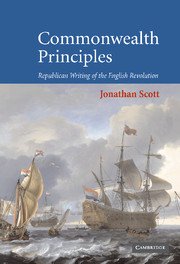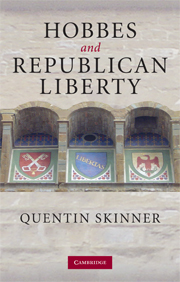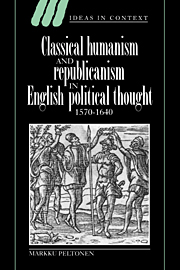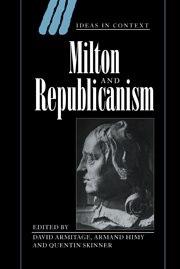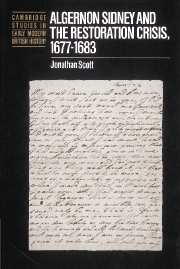Commonwealth Principles
Examining works which supported the abolition of monarchy and its replacement with a republic, Jonathan Scott ventures beyond existing studies of individual authors or specific themes to offer the first general account of an influential body of writing. Poets such as John Milton as well as journalists, political leaders, theorists and whig martyrs were among those contributing to the cultural ferment. The result is a major contribution to our understanding of seventeenth-century England, from one of its foremost historians.
- The subject is the most important intellectual and literary product of the English Revolution, and of enduring fascination to scholars in a number of different fields
- Jonathan Scott is established as one of the most important historians of the seventeenth-century writing today
- A single-volume survey of this major theme
Reviews & endorsements
"This erudite treatment of the subject is sure to become a standard. Essential."
Choice
"England's Troubles (Scott's previous book) was described by the TLS as 'brimming with originality and stuffed with insights that make it the most stimulating book on seventeenth-century history to have appeared in years, if not in decades'... Commonwealth Principles demonstrates the range, vigour and intrigue of intellectual English Republicanism... Commonwealth Principles presents a coherent and confident overview."
Times Literary Supplement
"Its chronological account of the unfolding of English republicanism across…the seventeenth century can be recommended as the best narrative now available. Its skeptical treatments of republican constitutionalism, conceptions of history and attitudes towards empire will inject informed controversy into much-debated fields. Its chapters on republicanism and `the cause of God' and on its relation to resistance theory will now bring studies of English republicanism into much more productive dialogue with recent work on early-modern Dutch and German republicanism. Moreover, the depth of Scott's primary research, his respectful treatment of previous scholarship and the unpretentious clarity of his prose will make the book a model for future studies of seventeenth-century political thought."
History of Political Thought
"Scott fills a glaring gap in the scholarly marketplace, by producing a wide-ranging exploration of republican writing in the long seventeenth century, which engages with and challenges leading authorities in the field…this is unquestionably an impressive work. Scott offers a thorough discussion…and an extremely subtle reading, on big and small issues alike. His achievement is all the greater for having reintegrated intellectual thought within a variety of historical contexts, and for having progressed beyond canonical texts…an immense achievement that will enlighten scholars and students from any number of disciplinary backgrounds."
Journal of British Studies
"Scott…has made his eloquently written book (it was hard to put down) required reading for students of early-modern republicanism…In his presentation and scrutiny of the varieties of republican ideology, the quality of Scott's work is on par with that produced by J.G.A. Pocock and Quentin Skinner…a…book that sheds new light on an area of English history and a political ideology that scholars assumed they already knew very well."
Canadian Journal of History
"A particular virtue of this book is its full development of…[Scott's] revisionist reading of James Harrington…such that …[its] larger significance beyond the re interpretation of that one writer is now visible…In doing so, he demonstrates the continuing vitality of scholarship on English republicanism, bringing new definition to a notoriously elastic term while also painstakingly tracing its development over time and the significant philosophical differences between its main protagonists…His focus on republicanism as a moral cause, rather than on particular constitutional forms, also grants him scope to make a major contribution to the current rehabilitation of the infamous turncoat Marchamont Nedham, in a patient and sympathetic analysis which is one of the most rewarding elements of the book…Scott is now firmly established as one of the most prominent scholars of seventeenth century republicanism, and this latest synthesis of his views will be impossible for scholars of this literature to ignore."
H-Albion, H-Net Reviews
"Jonathan Scott has established himself as a leading scholar of English classical republicanism a learned interpreter of the sources and discourses of its early modern exponents and a perceptive critic of the output of its modern historians…The book under review here resoundingly articulates its author's sense of the priority of principles…Empowered by opportunities raised by war and interregnum, the English republicans of the mid-seventeenth century were dedicated more to the moral project of the `reformation of manners' than to the formal one of the construction of constitutions…The pursuit of principle in preference to form drives a rethinking of the place of James Harrington a rethinking that Scott has undertaken, in respectful dissent from the views of J.G.A. Pocock, over a number of years… Commonwealth Principles… deserves to command the attention of a wide readership of early modern historians, and will assuredly stimulate further research."
Journal of Ecclesiastical History
"Few seventeenth century historians possess the mastery of these materials the way that Jonathan Scott does. His ability to combine a deep appreciation of the demands of doing political theory and political history is surely unrivaled…Commonwealth Principles is a remarkable achievement of an historian at the height of his powers."
Mark Kishlansky, Harvard University
"In addition to…[a] synchronic analysis of English republican writing, Scott provides a powerful diachronic analysis of it, an account of how the thinking of those who opposed the Stuarts developed over time and in response to rapidly changing political, military, economic, and cultural circumstances in England, the United Provinces, and the western hemisphere. This is fine interdisciplinary scholarly work which makes a major contribution to our understanding of the history of republican political thought at large."
European Legacy
Product details
January 2005Hardback
9780521843751
416 pages
229 × 152 × 27 mm
0.78kg
Available
Table of Contents
- Preface
- Introduction: English republicanism
- Part I. Contexts:
- 1. Classical republicanism
- 2. The cause of God
- 3. Discourses of a commonwealth
- 4. Old worlds and new
- Part II. Analysis:
- 5. The political theory of rebellion
- 6. Constitutions
- 7. Liberty
- 8. Virtue
- 9. The politics of time
- 10. Empire
- Part III. Chronology:
- 11. Republicans and Levellers, 1603–49
- 12. The English republic, 1649–53
- 13. Healing and settling, 1653–8
- 14. The good old cause, 1658–60
- 15. Anatomies of tyranny, 1660–83
- 16. Republicans and Whigs, 1680–1725
- Appendix: 'a pretty story of horses' (May 1654)
- Bibliography
- Index.

